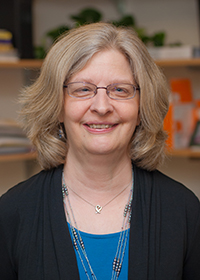For many parents, their first concern after a cancer diagnosis is the impact it will have on their children. There’s a lot of medical information to digest and decisions to be made, including how and when to tell your children.
There are good reasons talk to your children as soon as possible after your diagnosis. No matter their age, children will realize something is wrong; they may discover the truth accidentally from someone else, and it’s better if you can present the information in an honest and hopeful manner.
“The biggest message is the importance of honest, open communication,” says Jane Bausch, L.I.C.S.W. of Dana-Farber’s Social Work department.
Jane Bausch, LICSW, helps parents with cancer talk with their children.
It may be helpful to discuss how to break the news with a health care professional, partner, friend or therapist. Bausch notes that social workers, psychologists, psychiatrists, school counselors and pediatricians can help parents think about how to have these conversations and to support them and their children throughout their course of treatment.
While sooner is better than later, if you are very upset, it may be best to wait until you feel stronger. This doesn’t mean you have to be unemotional – you can let your children see that you have feelings, or even cry. This can be a starting place for the family to begin dealing with the situation together.
Be Prepared for Questions
Plan to talk when you have plenty of time to answer questions and comfort the children if they become upset – and don’t be surprised if they want to end the conversation after a short time. You can always return to it later.
“Oftentimes children don’t know quite what to ask but it’s important to give the message that they can ask any questions at any time,” Bausch says. “It’s ok to say ‘I don’t know’ and to get back to them later. It’s also important to offer a sense of hope, whatever is realistic given the situation. “
Age Matters
How you convey the news of your cancer diagnosis should be tailored to the child’s ability to understand. If your family includes children of different ages, you may decide to talk to them individually or in pairs rather than as a group.
In general, preschool children can absorb less information, so use direct, concrete language and answer only the questions they ask. Reassure you children that they can’t catch cancer from you, and emphasize that you didn’t get cancer because of something they did.
Children in elementary school will be more familiar with the body and may know something about cancer. Teenagers will have the most knowledge and can be quite worried and react emotionally. The question parents fear most is, “Are you going to die?” Be prepared for it. Here are some examples of answers you could give: “People do sometimes die from cancer, but lots of people don’t. I am not dying, I am going to take strong medicine and/or have surgery to get rid of my cancer.”
Or, “I am doing everything I can to make sure I get better. The doctors think I have a very good chance of recovering.”
You will likely revisit this conversation many times, so you don’t have to cover everything at once. Keep in mind that children are very resilient, and can adapt to almost any situation if they know what’s going on and who is watching out for them.
Courtesy of Dana-Farber Cancer Institute


How to tell your children you have cancer, check out today’s blog http://t.co/wQI00Vmqh6